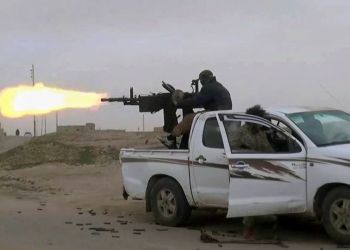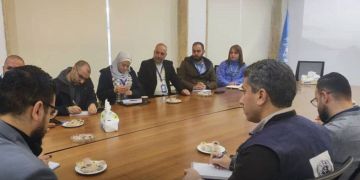This post is also available in:
![]() العربية
العربية
Deir Ezzor city has entered the second year of siege which was imposed on January 2015 by Daesh on the Assad regime controlled neighborhoods. The civilian situation has become a total nightmare, something unimaginable in which life has been crippled and civilians are deprived of all basic needs, causing many of them to die from hunger, malnutrition and lack of healthcare. Even the airdropped humanitarian aid are controlled by Assad’s forces.
Both, Assad’s forces and Daesh, are partners in the siege
The organization imposed the siege on January 2015. It cut off all roads leading to the regime held neighborhoods and has prevented the delivery of food and medicine into them. It also cut off electricity supplies to the besieged neighborhood, as well as landline phone services from the Shula town south of Deir Ezzor city, which isolated the trapped civilians from the outside world.
The Assad’s forces are also responsible of the inhumane siege as they have blocked access to civilians willing to leave the besieged areas for the organization run territory in the province or elsewhere. The regime did not provide the trapped civilians with no food and medicines, which has resulted in catastrophic consequences on the humanitarian level.
Looted humanitarian aid
Assad’s forces began the transportation of food via cargo planes to the besieged areas, claiming that they wanted to alleviate the suffering of civilians in need of food supplies. However, the traders and owners of commercial shops, who have strong ties with Assad’s forces and officers, are selling those supplies for sky-high prices in the city.
All the humanitarian aid that are being airdropped for the besieged civilians are looted by Assad’s forces who divide around 70 percent of the aid among them, while the rest are delivered to the helpless civilians by the SARC.
Ahmed, a local from the Joura neighborhood, confirmed to D24 that ,” The biggest part of the humanitarian aid, which are airdropped by the UN Food Program, are being looted by Assad’s forces and then sold in the black markets for high prices.”
The siege has killed them
The shelling that target the besieged neighborhoods have claimed the lives of more than 210 civilians, including elderly, women and children. More than 100 were killed in Daesh’s shelling the besieged neighborhoods, while more than 100 are wounded. More than 52 helpless civilians died from hunger and malnutrition. Around 30 civilians were killed while attempting to flee or enter into the besieged areas. The organization executed more than 58 people on charges of smuggling food items into those areas.
All the victims of the siege were the civilians.
No electricity, a water and firewood shortage
Because Daesh is in control of all the power plants in the province, it has cut off electricity to the besieged areas since 2015, forcing the trapped civilians to utilize candles and primitive means as an alternative for electricity. The cutting off of electricity has also rendered many water plants out of commission.
There are only two water plants in the besieged areas, which only function for few hours after each four days, meaning that the water flow cannot suffice the need of the locals.
Ahmed, a local from the Joura neighborhood, stated to D24 that, “ The power outage in the besieged areas and the not providing of diesel for the water plants to function by Assad’s forces, have pushed civilians to bring the untreated water of the Euphrates River.”
Due to lack of fuel and the increase of their prices, if available, have led the trapped civilians to use firewood for heating and cooking purposes. One liter of fuel oil costs more than 2000 SYP, meaning that it is impossible for those civilians, whose monthly salary do not exceed 50000 SYP, to buy it.
One kg of firewood; which is taken from the trees of the parks and streets, is sold for 200 SYP. According to the locals, 90 percent of the trees in the besieged neighborhoods were cut by the trapped civilians.
A lack of medicine and there is only badly equipped hospital
All pharmacies, including the private ones, have been closed due to the unavailability of medicines and because the merchants are now unable to bring them to the besieged areas. The only medicine provider in besieged Deir Ezzor is the SYP, even if they are limited to painkillers and medicines for inflammation.
A doctor from besieged Deir Ezzor mentioned to D24 that, “ Medicines for chronic diseases are unavailable. We only have painkillers and other medicines for inflammation, which are obtained with difficulty as we have to queue for hours at the SARC distribution centers.”
He added, “The situation has improved recently after the International Healthcare Organization airdropped 14 tons shipments of medical supplies, however, the amount is still insufficient when taking into account the number of the trapped civilians.”
Concerning hospitals, there are only two hospitals. The first is the military hospital which is only used for treatments of Assad’s forces and allied militias. The second is the Assad Hospital which receives civilians. However, it was closed a month ago after Daesh gained control over it in an offensive and retreated later on. The organization looted all the equipment and destroyed what remained, crippling the heath situation in the Assad’s forces controlled areas.
Education continues with difficulty
Civilians living under siege cannot concentrate of their studies at school. Because of the deteriorating situation in besieged Deir Ezzor, many students are now working in order to help their families survive, while some have volunteered to fight for the NDF militias to earn a living.
Concerning universities, many educational staff have left the besieged city, which led many faculties to stop the education process. In addition, education is restricted to those residing in the besieged areas as Daesh prevent those living under its control from going to universities in the regime held areas.
Forced conscription
Six months after the imposing of the siege, Assad’s forces began the forced recruitment of many young men in their controlled areas in a move to protect and defend the regime pocket in Deir Ezzor. Employees of municipalities and university were first exempted from the forced conscription program, but after the organization took control over the Bughwayliya town and Ayash Arms Depots, they began recruiting anyone whose age is between 18-45.
The arrested are taken to the regime headquarters in Brigade 1347 and the Talai’ Camp where they undergo a training session that does not exceed 10 days. Then, they are deployed to the front lines, where they fall as easy prey because of not having the combat skills to fight.










